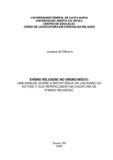| dc.contributor.advisor | Souza, Sandra Elisa Réquia | |
| dc.creator | Oliveira, Jussara de | |
| dc.date.accessioned | 2021-03-02T11:09:44Z | |
| dc.date.available | 2021-03-02T11:09:44Z | |
| dc.date.issued | 2020-12-20 | |
| dc.date.submitted | 2020 | |
| dc.identifier.uri | http://repositorio.ufsm.br/handle/1/20364 | |
| dc.description | Trabalho de Conclusão de Curso (graduação) - Universidade Federal de Santa Maria, Centro de Educação, RS, 2021 | por |
| dc.description.abstract | Despite being a secular state, Brazil has instituted the obligation of Religious Education in public elementary schools. This study has as its theme religious education in high school, and seeks to prove the secular character of the discipline, differentiating it from religion classes, evaluating whether it meets the pluralist and interreligious ideal defined by the main authors involved in the implementation of the discipline. Through a bibliographic search, the study seeks to analyze the history of Religious Education in Brazil and Rio Grande do Sul, discuss the importance of the secularity of the State and its repercussion in the discipline of Religious Education and analyze the contents worked and the methodologies employed in religious teaching classes. At the end of the study, it was found that Religious Education, through the content developed, will trigger dialogue as a reality that is established from the words of different people. In the State of Rio Grande in the South, the contents of the Religious Education curricular component are determined by the school, according to its pedagogical project, observing the national curricular guidelines and based on curricular parameters that will be established under the coordination of the Secretariat of Education. The principle of secularism removes religion from the rule of the State and gives all citizens the right to respect whether or not they have a certain religious conviction, being able to freely profess it within the limits of the law. In Religious Education, the teacher must be able to welcome students and use their experiences, so that they can put aside any and all prejudice and give themselves the opportunity to know what is different. | eng |
| dc.language | por | por |
| dc.publisher | Universidade Federal de Santa Maria | por |
| dc.rights | Acesso Aberto | por |
| dc.rights | Attribution-NonCommercial-NoDerivatives 4.0 International | * |
| dc.rights.uri | http://creativecommons.org/licenses/by-nc-nd/4.0/ | * |
| dc.subject | Laicidade | por |
| dc.subject | Ensino médio | por |
| dc.subject | Ensino religioso | por |
| dc.subject | Religious education | eng |
| dc.subject | High school | eng |
| dc.subject | Secularity | eng |
| dc.title | Ensino religioso no ensino médio: uma análise sobre a importância da laicidade do estado e sua repercussão na disciplina de ensino religioso | por |
| dc.title.alternative | Religious education in high school:an analysis on the importance of the state's laicity and its repercussion in the religious teaching discipline | eng |
| dc.type | Trabalho de Conclusão de Curso de Graduação | por |
| dc.degree.local | Polo de Quaraí, RS, Brasil | por |
| dc.degree.graduation | Ciências da Religião | por |
| dc.description.resumo | Apesar de ser um Estado laico, o Brasil instituiu a obrigatoriedade do Ensino Religioso nas escolas públicas de Educação Fundamental. Este estudo tem como tema o ensino religioso no ensino médio, e procura comprovar o caráter laico da disciplina, diferenciando-a das aulas de religião, avaliando se ela atende o ideal pluralista e inter-religioso definido pelos principais autores envolvidos na implantação da disciplina. Por meio de uma pesquisa bibliográfica, o estudo busca analisar a história do Ensino Religioso no Brasil e no Rio Grande do Sul, discutir a importância da laicidade do Estado e sua repercussão na disciplina de Ensino Religioso e analisar os conteúdos trabalhados e as metodologias empregadas nas aulas de ensino religioso. Ao final do estudo, verificou-se que Ensino Religioso, por meio dos conteúdos desenvolvidos, desencadeará o diálogo como realidade que se estabelece a partir da palavra de diferentes. No Estado do Rio Grande no Sul, os conteúdos do componente curricular de Ensino Religioso são fixados pela escola, de acordo com seu projeto pedagógico, observadas as diretrizes curriculares nacionais e com base em parâmetros curriculares que serão estabelecidos sob a coordenação da Secretaria da Educação. O princípio da laicidade afasta a religião do domínio do Estado e dá a todos os cidadãos o direito ao respeito de ter ou não determinada convicção religiosa, podendo professá-la livremente dentro dos limites da lei. No Ensino Religioso o professor deve ser capaz de acolher os alunos e usas vivências, para que possam deixar de lado todo e qualquer preconceito e possam se dar oportunidade de conhecer o diferente. | por |
| dc.publisher.country | Brasil | por |
| dc.publisher.initials | UFSM | por |
| dc.subject.cnpq | CNPQ::CIENCIAS HUMANAS::TEOLOGIA | por |
| dc.publisher.unidade | Centro de Educação | por |



